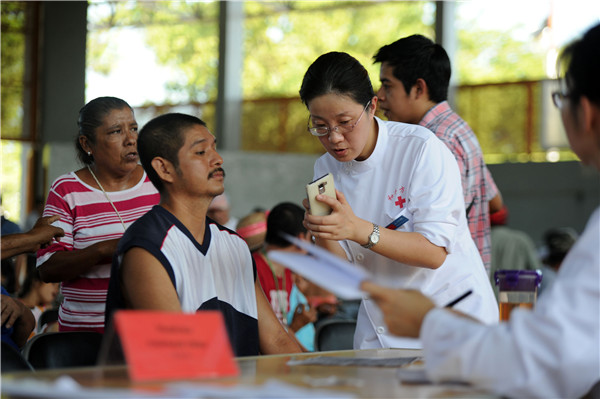Will translation software sound the death knell for interpreters?
 0 Comment(s)
0 Comment(s) Print
Print E-mail China Daily, February 22, 2016
E-mail China Daily, February 22, 2016
 |
|
A Chinese doctor tries to communicate with her Mexican patient with the help of Baidu translate app on her smartphone.[China Daily]? |
If, as the Chinese proverb goes, "to learn a language is to have one more window from which to look at the world", Chinese search engine Baidu has provided the country with a portal to the entire planet at their fingertips. Earlier last month, the Baidu Translate app was given a top national science award for their work advancing automated translations in a rarely seen honor for internet companies.
"It earned the honor for its technological merit and social significance," Wang Haifeng, vice-president of Baidu, said.
"The Baidu Translate App can recognize text, voices and even pictures. For example, travellers can take a photo of the menu and the app will read the menu and do the translation."
Wang has led the research team for Baidu Translate over the past six years. He said the software can now translate 27 languages, currently has 500 million users worldwide and responds to over 100 million translation requirements every day.
It is often used by online retailers to translate product descriptions, saving them the cost of hiring translators.
And it is expanding quickly, taking them only about 11 days to launch a new language, Wang said.
"We collect bilingual data on the Internet, the computer will then study the data automatically and form translation models accordingly," he said.
But the rapid development of machine translations has raised concerns that translating jobs may soon be endangered and whether learning a second language will soon be useless.
Zou Tingfang, an interpreter involved in legal work, believes automated translations are unlikely to beat translators in the foreseeable future.
"I use software when doing translations, but I never use it when interpreting. Machines still have many limits," she said. "Language, especially when spoken, is lively and dynamic. Machines cannot handle changes as adequately as human beings. For example, when interpreting, one word can have more than ten meanings depending on the occasion. Machines still cannot precisely distinguish different contexts."
But automated translations can be accurate for translating languages with fixed context, such as billboards, online games or contracts, she said.
Zhou Min, an English instructor at Nanchang University in Jiangxi province, said, "I am a frequent user of machine translations. The convenience is undeniable, but a machine is a machine. It still cannot respond to variations adequately, since it lacks the flexibility of a human brain."
Wang Haifeng believes machine and human translators can complement each other. "A translation system can master dozens of languages and jargon in different fields, but good translators can better convey the exquisite beauty of language," he said.
When analyzing user demand, Wang found the app's visitors rose sharply at the weekend. "We believe it is because many students are using our product as an aid when doing homework," he said.
This trend has Yao Ying, a teacher at the Shanghai New Oriental language school, a little worried.
"Many of the students are using translation software. Machine translation has offered them a shortcut, but I am not sure whether it will do any good to their study considering their lack of accuracy."
"It can only supplement, not substitute, traditional book learning," she said.
Zhou Min believes that machine translation is also changing people's attitudes towards language learning, but the enthusiasm of learning will not fade in the era of machine translations.
"For people who need to learn a certain language for occasional use, they will not have to study the language since an app can solve the problem. While for those who are learning languages as a major or planning a long-term stay in a foreign country, machine translation can help them learn more efficiently," she said.
Zou Tingfang said even if machine translations become so advanced that they can meet all translation needs in the future, people would still want to gain a working knowledge of different languages.
"People are born with the desire to express and communicate," she said. "There will always be a need of direct and in-depth communication."





